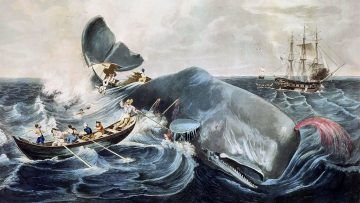Carl Safina in The New York Times:
 In 1841, while aboard the whaler Acushnet, Herman Melville met William Chase among another ship’s complement. William lent Melville a book by his father, Owen Chase: “Narrative of the Most Extraordinary and Distressing Shipwreck of the Whale-Ship Essex.” Melville had read Jeremiah Reynolds’s violent account of a sperm whale “white as wool,” named — for his haunt near Mocha Island, off the coast of Chile — Mocha Dick. It’s unknown what led Melville to tweak Mocha to “Moby.” Good thing he did, and that Starbuck was the name he gave his first mate rather than his captain. Otherwise the novel would follow Starbuck’s obsession with a Mocha. Owen Chase gave Melville his climax: As Essex’s boats were harpooning female sperm whales, a huge male, around 85 feet, rushed and holed the 88-foot ship, twice. No whale had ever sunk a ship. “The reading of this wondrous story upon the landless sea, and so close to the very latitude of the shipwreck had a surprising effect upon me,” Melville later recalled.
In 1841, while aboard the whaler Acushnet, Herman Melville met William Chase among another ship’s complement. William lent Melville a book by his father, Owen Chase: “Narrative of the Most Extraordinary and Distressing Shipwreck of the Whale-Ship Essex.” Melville had read Jeremiah Reynolds’s violent account of a sperm whale “white as wool,” named — for his haunt near Mocha Island, off the coast of Chile — Mocha Dick. It’s unknown what led Melville to tweak Mocha to “Moby.” Good thing he did, and that Starbuck was the name he gave his first mate rather than his captain. Otherwise the novel would follow Starbuck’s obsession with a Mocha. Owen Chase gave Melville his climax: As Essex’s boats were harpooning female sperm whales, a huge male, around 85 feet, rushed and holed the 88-foot ship, twice. No whale had ever sunk a ship. “The reading of this wondrous story upon the landless sea, and so close to the very latitude of the shipwreck had a surprising effect upon me,” Melville later recalled.
He initially planned a book about whales and whaling. Reynolds helped supply Melville with a more Stygian idea, by exhorting his men to attack Mocha Dick as “though he were Beelzebub himself!” — a demon rather than a whale. Yet Moby Dick is neither whale nor demon, but a white prop contrasting with the demonic Captain Ahab, the tormented tormentor, the malignant, abused abuser of authority and of men. Ahab’s bias is personal and color-based. A white whale becomes a blank pincushion for Ahab’s thrusting mania as Melville shades pages with his madness. Yet — and this was absolutely astonishing for its time — Moby Dick becomes the ultimate asserter of reason. In self-defense the whale delivers justice. And never dies.
…By the 1840s, having ventured half the world away from America, Melville cast a frigatebird-like perspective on the American character’s deepest congenital malignancy, then called Negrophobia. In the early 19th century, sperm whale hunting was never far from slave trading. Thomas Beale’s 1839 “The Natural History of the Sperm Whale” included this telling dedication to the British shipowner Thomas Sturge: “Your character may be estimated by the incessant efforts you have made to liberate the Negro from the condition of the slave.” On docks and decks humans of varied skin shades and breathing one another’s sweat in close company tended whale-boiling caldrons and looked one another in the eye. Light-skinned men could feel trapped and dark men could taste freedom, surviving, sometimes drowning, together. Melville’s ever-philosophical narrator, Ishmael, asks: “Who ain’t a slave? Tell me that.”
More here.
